
The Peruvian Aprista Party is a Peruvian social-democratic political party and a member of the Socialist International. The party was founded as the American Popular Revolutionary Alliance by Víctor Raúl Haya de la Torre, who originally intended to create a network of anti-imperialist social and political movements in Latin America. Members are called "compañeros" (fellows), based on the fraternity espoused by Haya de la Torre. Originally a centre-left to left-wing party with democratic socialist and nationalist elements, the party moved closer to the political centre under the leadership of Alan García starting in the 1980s, embracing social democracy and later some Third Way policies. In 2006, the party adopted a new platform as García's second presidency implemented a series of policies labelled as centre-right, embracing free-market capitalism, dialogue with other right-wing parties and organizations in the country, and closer ties with the Catholic Church and Evangelical churches.

Víctor Raúl Haya de la Torre was a Peruvian politician, philosopher, and author who founded the American Popular Revolutionary Alliance (APRA) political movement, the oldest currently existing political party in Peru by the name of the Peruvian Aprista Party (PAP).

Luis Juan Alva Castro is a Peruvian economist and politician. In his political career, he achieved the government positions of Second Vice President of Peru, Prime Minister of Peru, President of the Congress and among other portfolios during both administrations of President Alan García.

Alan Gabriel Ludwig García Pérez was a Peruvian politician who served as President of Peru for two non-consecutive terms from 1985 to 1990 and from 2006 to 2011. He was the second leader of the Peruvian Aprista Party and to date the only party member ever to have served as President. Mentored by the founder of the APRA, Víctor Raúl Haya de la Torre, he served in the Constituent Assembly of 1978–1979. Elected to the Peruvian Congress in 1980, he rose to the position of General Secretary of the APRA in 1982, and was subsequently elected to the presidency in 1985 in a landslide victory at the age of 35 years.
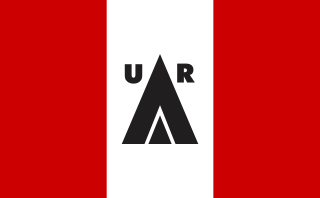
The Revolutionary Union, was a nationalist political party in Peru founded in 1931 by Luis M. Sánchez Cerro, former president of Peru. The party was formed following the coup with which Sanchez Cerro overthrew the eleven-year dictatorship of Augusto B. Leguía. Initially an authoritarian-populist organization, the party later transitioned towards fascism following the assassination of its founder, with Luis A. Flores assuming leadership in 1933 and consolidating this ideological shift.

China–Peru relations are foreign relations between the People's Republic of China and the Republic of Peru. Peru is the first Latin American country that China established formal ties with, which was done by the Qing dynasty in August 1875. Both nations are members of the Asia-Pacific Economic Cooperation and the United Nations.

Carlos Echeverri Cortés was a Colombian economist and diplomat who served as ad interim fifth Permanent Representative of Colombia to the United Nations, and as Ambassador of Colombia to Peru and Mexico. During his ambassadorship in Peru he became an enemy of the administration of President Manuel Arturo Odría Amoretti for granting political asylum to the politician Víctor Raúl Haya de la Torre, an action that drove the Peruvian Government to mount a five-year struggle harassing embassy staff and personnel, and forming a military blockade around the Colombian Embassy where Haya was housed, this because Lima had refused to grant safe conduct for Haya to leave the country and Ambassador Echeverri refused to give him up.

The nations of Mexico and Peru established diplomatic relations in 1823. Diplomatic relations were briefly cut in 1932 and reinstated again in 1933. Both nations are members of the Asia-Pacific Economic Cooperation, Community of Latin American and Caribbean States, Lima Group, Organization of Ibero-American States, Organization of American States, Pacific Alliance and the United Nations.
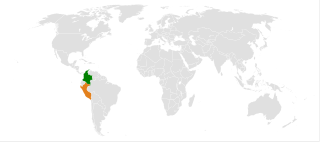
Colombia–Peru relations are the bilateral relations between Colombia and Peru. Both nations are members of the Community of Latin American and Caribbean States, Lima Group, Organization of Ibero-American States, Organization of American States, Pacific Alliance and the United Nations.
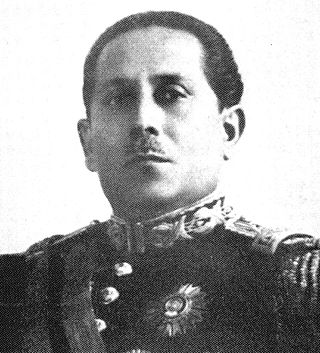
Antonio Rodríguez Ramírez was a Peruvian military officer and politician who served as Minister of Government and Police (1935-1939) and Second Vice President of the Republic (1936-1939) under General Óscar R. Benavides.
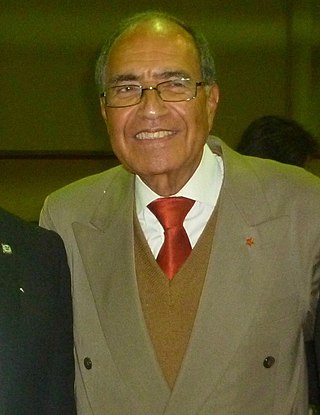
Carlos Roca Cáceres is a Peruvian politician. A prominent member of the Peruvian Aprista Party, he was signaled in his youth as one of Víctor Raúl Haya de la Torre's main disciples, alongside future President of Peru, Alan García. In his political career, he served in the Constituent Assembly of 1978–1979, which drafted the Constitution of 1979, in the now-abolished Chamber of Deputies, and finally as Peruvian Ambassador to Italy, appointed in Alan García's second presidency.

The 1962 Peruvian coup d'état was promoted by the then Chief of the Joint Command of the Peruvian Armed Forces, General Ricardo Pérez Godoy, against the outgoing government of Manuel Prado Ugarteche for alleged irregularities in the electoral process of that year.

Antonieta Zevallos Núñez de Prialé was a Peruvian politician who served in the Chamber of Deputies from 1980 until 1985, representing Lima as a member of the Peruvian Aprista Party. Her husband Ramiro Prialé was one of the founders and most prominent figures of the party.
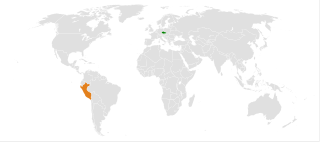
Czech Republic–Peru relations are the bilateral relations between the Czech Republic and Peru. Both countries are members of the United Nations.
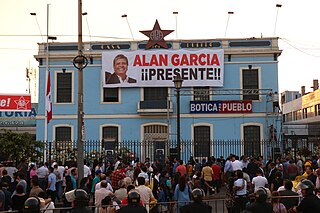
The Casa del Pueblo is a building that serves as the main headquarters of the American Popular Revolutionary Alliance, a political party in Peru. In addition to its political functions, it also provides social services, incling education, healthcare and soup kitchen.

Carlos Miró Quesada Laos was a Peruvian journalist, politician and diplomat.

















